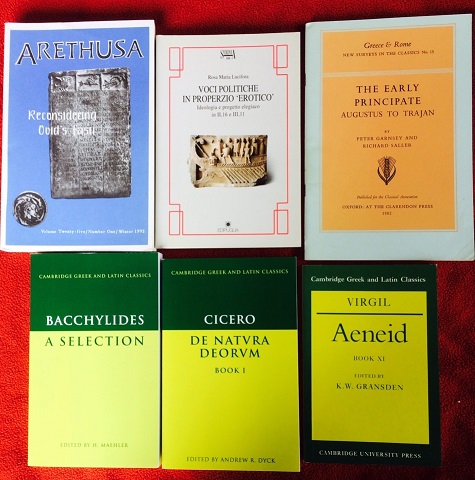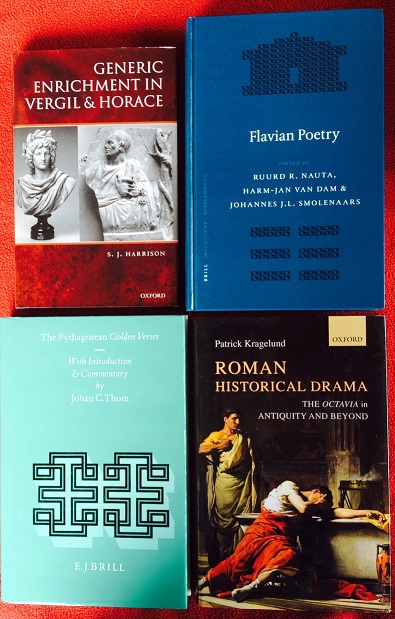For Ovid’s 2059th birthday, here’s a note on his death-year. It could use some footnotes, but this should do for a funeral offering.
We’re all celebrating commemorating the 2000th anniversary of the death of Ovid this year, but the date of a poet’s last datable poem is not always a reliable guide to his date of death – not even for the most compulsively productive poet in Latin literature, whose attempts to write prose came out as verse against his will (so he says: Tristia 4.10.25-26).
Others have noted that Tacitus gives him no obituary in the Annales, which cover A.D. 17 and show an interest in writers oppressed by tyrants. (Could that chapter have fallen out? Perhaps Tacitus scholars can tell us whether there are likely lacunae in Annales I-VI beyond the huge one that has swallowed up most of Book V and part of Book VI.)
The purpose of this note is to point out that there are a number of things that might have ended his writing career some years before he died:
1. Catatonic depression. Ovid must have been fairly confident that he would outlive Augustus, who was nearly twenty years older, though in the end it took longer than he must have hoped. Once he had done so, and his attempts to convince the new emperor (a year and a half younger than Ovid), and his influential nephew Germanicus, had failed, it must have been clear that he would never return from exile, but would die in Tomis. Depression or even despair at that point would have been likely enough. Did he throw away his pen and ink and papyrus and stare out at the Black Sea for some years until he died? Perhaps not: people that depressed tend to lose their appetite for eating and drinking (drinking in moderation, at least) as well as for writing, and do not usually hang on for years, but there are exceptions.
A variation on depression is writer’s block: the two are not incompatible. If five books of Tristia and four of Epistulae ex Ponto were not good enough to persuade Tiberius or Germanicus to allow his return, he might have felt incapable of writing anything that would. Sibelius more or less gave up composing at 61, though he lived for another 30 years. Rossini and Congreve did much the same, though apparently in a more positive way, enjoying their well-earned retirements. (I will not compare Rimbaud, who abandoned poetry much younger. Perhaps someone should write a novel in which Ovid quits poetry at age fifty-nine in favor of a new career supplying the local tribal chiefs with civilized military technology.)
2. Medical Disability. Some writers of words and of music have had their careers, but not their lives, ended by serious medical problems. Ravel’s career as a composer ended five years before his death, when a blow on the head left him unable to compose, though scholars are still arguing the precise diagnosis. H. L. Mencken’s astonishingly productive writing career ended seven years before his death, when a stroke left him unable to read or write. Ovid might well have suffered a similar stroke. Blindness is another possibility: a competent Miltonic amanuensis might have been hard to find in Tomi. Even gout or severe arthritis would have made verse composition very difficult in Tomi, where Ovid would have had difficulty finding a proficient scribe.
Of course, even a less-than-completely-debilitating physical condition would have reinforced a tendency to despair, so a combination of the first two reasons is possible.
3. Communication Problems. I don’t believe Ovid gives us any hints as to how his verses were sent to Rome. Did the local military commander (there must have been one in a port on the border) send them along with military dispatches? That would be a courtesy a poet could not demand, and might well change with a new commander or governor – or emperor, for that matter, though he was not immediately cut off when Tiberius succeeded. Or did Ovid have enough money and friends to pay a local ship-captain who made regular voyages to Byzantium or Athens or Rhodes to deliver his manuscripts to a friend there, who would take care of further travel? If he ran out of money, or his friends in Greece died, then what? Although relegation meant he kept nominal control over his property, I doubt he could exercise much actual control. Did his wife die before him? Did a son-in-law or nephew get hold of his estate? Or was the estate simply too small to support regular communications with one so far away? It seems to me (in my relative ignorance of ancient communications methods) that there would have been a lot of different ways communications could have been cut off before his death.
My conclusion is simple. We can and should commemorate the presumed death of Ovid this year, but it would be going too far to say that his death in A.D. 17 is a fact.
There is a PDF of this note at here. Comments welcome.






